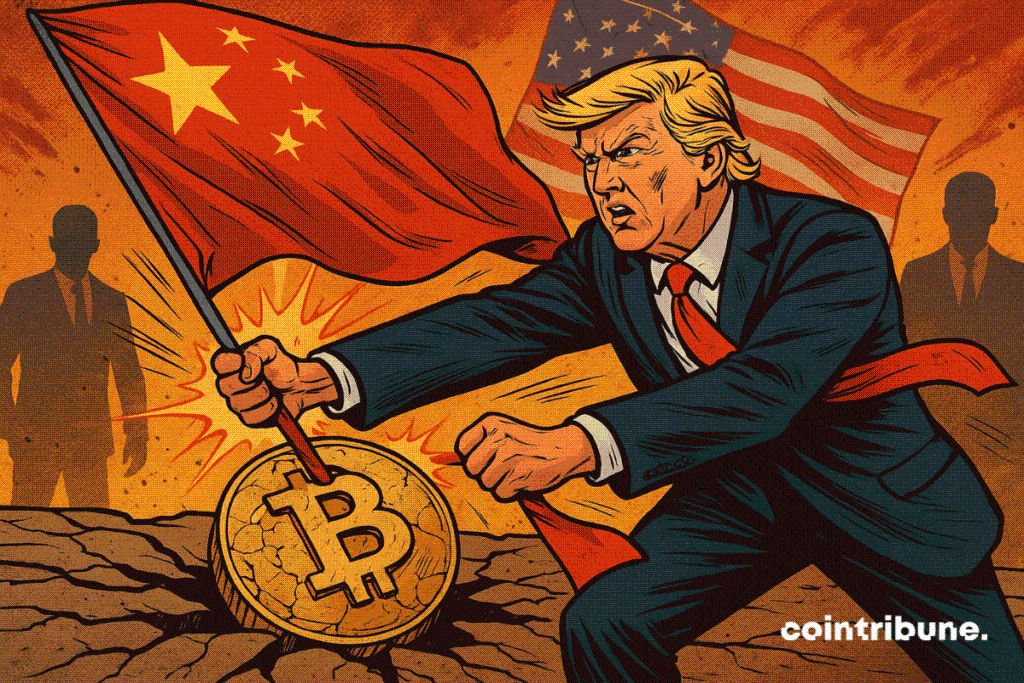Bitcoin: Trump Seeks to Reassert U.S. Control Amid China’s Crypto Offensive
At the heart of an ongoing trade war, Donald Trump revives an old promise: to make the United States the bitcoin superpower. The scene is set. Facing the rising power of China in digital technologies, the American president, just re-elected, puts crypto back at the center of the national strategy. This comeback is not trivial. It draws from the foundations of his campaign speech to propose an economic model focused on innovation, digital assets, and monetary autonomy.

In brief
- Trump promises an American response to China’s crypto offensive and the digital yuan.
- Washington wants to attract crypto players with clear rules and mandatory reserves.
- Hong Kong loosens regulatory grip, restarting China–US monetary rivalry.
- The president links crypto leadership and dollar sovereignty in his recent speeches.
Bitcoin as a banner, regulation as a lever: Washington rolls out its plan
President Trump, still in search of the Nobel Peace Prize , did not mince words in Miami at the America Business Forum. Before business leaders, he hammered : “We’re making the United States the Bitcoin superpower, the crypto capital of the world, the undisputed leader in artificial intelligence“.
This message resonates as a turning point. Since January 2025, the Trump administration has signed executive orders to lift regulatory blocks and encourage the crypto industry. Among key measures: the GENIUS Act , passed in July, imposes mandatory reserves on stablecoin issuers, with monthly publication of their composition.
But it’s not just a matter of legal framework. For Trump, crypto also supports the dollar while strengthening America’s position in innovation. He states:
And it takes a lot of the pressure off the dollar. It does a lot of good things, but we’re into it.
The message is clear: crypto is a tool of monetary power as much as a technological lever.
China: ban crypto while drawing inspiration from it
Officially, China remains hostile to cryptos. Since 2021, Beijing has banned bitcoin transactions and mining. Yet, this apparent caution hides a more subtle strategy. Trump has expressed concern:
China … China wants to do it. They’re starting it, but they want to do it. Other countries want to do it. If we don’t do it properly — it’s a big industry.
China is betting on its own digital currency, the digital yuan , and on centralized flow control. But from Hong Kong, the door is ajar. This special administrative region has relaxed some restrictions, allowing registered platforms to offer more services around digital assets.
Meanwhile, China extends its influence via the deployment of the digital yuan and the systematic refusal of any private crypto competition. Behind the scenes, Beijing advances its pawns. By denouncing this tactic, Trump repositions the United States as a bastion of free crypto against centralized state models.
Crypto vote, a new electorate to conquer
This pro-crypto shift was not only about geopolitical stakes. It was also aimed at an electorate. Before the elections, Trump explained that his campaign supported digital assets from the start, and that Biden joined late after realizing his loss of ground among crypto voters.
The crypto industry is no longer a niche issue. It matters in public opinion. It embodies a new promise: gains, social mobility, financial independence. For Trump, this dynamic can make America a new economic engine.
The future presented blends AI, blockchain, tokenization, and energy sovereignty through local mining. This vision appeals to both investors and small holders. It gives an image of modernity and reconquest, at a time when China is trying to dictate its own digital roadmap.
Dates, figures, realities: what to remember
- July 2025: passage of the GENIUS Act on stablecoins;
- Estimated 200,000 BTC in the hands of the U.S. government;
- 70% of the bitcoin global hashrate was Chinese before 2021;
- The digital yuan is in the national deployment phase.
If Trump continues in this direction, he will face a harsh reality. China retains a grip on rare earths , essential to manufacturing AI chips. This strategic imbalance could weaken the dollar according to some analysts.
Disclaimer: The content of this article solely reflects the author's opinion and does not represent the platform in any capacity. This article is not intended to serve as a reference for making investment decisions.
You may also like
Bitcoin News Update: Trump's Pause on China Tariffs Triggers Worker Protests Over Future of U.S. Shipyards
- Trump administration suspends China tariffs on shipbuilding imports, drawing labor union criticism over domestic industry risks and worker refunds. - 175 H-1B visa abuse investigations reveal $15M+ potential refunds, as unions warn of wage suppression and corporate favoritism in trade policies. - Square enables Bitcoin payments for 4M U.S. merchants, advancing crypto adoption while Trump dismisses inflation concerns and vows meatpacking crackdowns.

Bipartisan Legislation Assigns Crypto Regulation to CFTC to Clarify Oversight Uncertainty
- U.S. lawmakers propose shifting crypto regulation from SEC to CFTC via a bipartisan bill, reclassifying most digital assets as commodities. - The draft aims to resolve regulatory ambiguity stifling innovation, building on stalled House CLARITY Act efforts during the 38-day government shutdown. - Market optimism surged as shutdown relief pushed Bitcoin above $105k, with ETF outflows persisting amid anticipation of clearer CFTC-led oversight. - Critics warn of CFTC resource constraints, while proponents hi

Solana News Update: DevvStream Invests in SOL Despite $11.8M Deficit, Shows Strong Confidence in Sustainable Blockchain Prospects
- DevvStream Corp. (DEVS) disclosed holding 12,185 SOL and 22.229 BTC, staking SOL for 6.29% annualized yield amid a $11.8M fiscal 2025 loss. - The company launched a digital asset treasury via BitGo/FRNT Financial, securing $10M liquidity from a $300M convertible note facility. - Plans include a 2026 tokenization platform for carbon credits and Solana staking, aligning with its de-SPAC/Nasdaq listing strategy. - Despite crypto market outflows, DevvStream's staked SOL attracted inflows, contrasting broader
ALGO Falls by 2.28% Over 24 Hours as Short- and Long-Term Performance Shows Mixed Results
- ALGO dropped 2.28% in 24 hours to $0.1844, contrasting with 17.29% weekly and 4% monthly gains but a 44.84% annual decline. - Traders monitor ALGO's resilience amid macroeconomic shifts, though long-term bearish trends highlight structural challenges. - Key support at $0.18 could trigger bullish momentum if held, while breakdown risks further declines toward $0.15. - A backtest analyzing 15% single-day spikes aims to assess ALGO's potential for sustained gains or pullbacks post-rallies.
